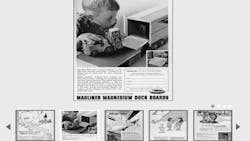“It is reasonably predictable that computers will become a common carrier, a public utility, and that only organizations with quite extraordinary needs will have their own. Steel mills today have their own generators because they need such an enormous amount of power. Twenty years hence, an institution that’s the equivalent of a steel mill in terms of mental work—MIT, for example—might well have its own computer. But I think most other universities, for most purposes, will simply plug into time-sharing systems.”
This prediction, written almost 50 years ago, proves that Al Gore did not invent the Internet. Peter Drucker did. Well, this 20th century management guru has as much right to make that claim, considering the insight he displayed in this piece he wrote for the December 1967 issue of the McKinsey Quarterly. The title of this piece summarizes Drucker’s attitude about mindless dependence on high tech: “The Manager and the Moron.” The moron Drucker refers to is the computer.
Although he didn’t address the advent of laptops and handhelds, Drucker wasn’t far off in saying enterprises wouldn’t need their own computers. We don’t call those things we carry on our belts or on our wrists computers. They’re Smart Phones and iWatches. They just happen to be as powerful as the room-size computers of Drucker’s younger days. “Plug into time-sharing systems?” That sounds like today’s Cloud environment to me.
But Drucker’s genius didn’t end there. Here’s more from that same article:
“We will spend more and more money on producing the things that make a computer usable—the software, the programs, the terminals, and so on. The customers aren’t going to be content just to have the computer sitting there.”
Again, he was right on. Today information companies give hardware away so their customers can pay through the nose for the stuff that flows through those boxes.
And how about this:
“Now we can begin to use the computer for the things it should be used for—information, control of manufacturing processes, control of inventory, shipments, and deliveries. I’m not saying we shouldn’t be using the computer for payrolls, but that’s beside the point. If payrolls were all it could do, we wouldn’t be interested in it.”
That’s where Drucker shows his hand. Someone picking up his article based on the headline might have been expecting an anti-technology screed. But his conclusion is just as strong as his headline:
“[The computer is] a total moron, and therein lies its strength. It forces us to think, to set the criteria.”
Now we’re in trouble!
Today everyone in supply chain and logistics management is complaining how hard it is to attract talent to join their ranks. Drucker challenged the business leaders reading his piece to get to know the people working under them in their factories and warehouses. He believed it was management’s failure to “go out and look” that accounted for most managerial mistakes.
I have to thank our friend John Hill, director of the St. Onge supply chain consulting firm and loyal member of MH&L’s editorial advisory board, for bringing Drucker’s article to my attention. I think he did so because he and I took part in an e-mail discussion with a few other logistics professionals about the challenges of working with millennials (those born between 1982 and the early 2000s). This discussion was prompted by a blog MH&L posted recently, addressing some of the challenges of managing Millennials. The other participants in our e-mail exchange bought into the stereotypes tied to this generation (spoiled, feeling entitled, parent-dependent, etc.), but John would have none of it. He stood up for the younger generation’s fresh approach to challenges and their flexibility. I think that debate is what prompted John to share a piece of Drucker’s mind with me.
It also gave him an opening to give me a preview of a panel discussion he’ll co-host next March during ProMat 2015 in Chicago. The title: “Leveraging WMS & Metrics to Drive Warehouse Performance Improvement.” It might not be as controversial as the headline Drucker chose for his 1967 piece, but John is using Drucker’s backhanded compliment to the computer’s value as a thinking tool to sell his session.
The session will not only be open to Millennials, but to anyone trapped in a system designed for doing things the way they’ve always done them. Those people should be called Perennials.
If you were surprised by Drucker’s vision of the future from a half century ago, you’ll love the gallery we just posted, saluting material handling companies from 55 years ago. This is a collection of ads from a year’s worth of Material Handling Engineering—MH&L’s grandfather. The year: 1960. The ads: Historic.
About the Author
Tom Andel Blog
former Editor-in-Chief
As editor-in-chief from 2010-2014, Tom Andel oversaw the strategic development of MH&L and MHLnews.com, bringing 30+ years of thought leadership and award winning coverage of supply chain, manufacturing logistics and material handling. Throughout his career he also served in various editorial capacities at other industry titles, including Transportation & Distribution, Material Handling Engineering, Material Handling Management (predecessors to MH&L), as well as Logistics Management and Modern Materials Handling. Andel is a three-time finalist in the Jesse H. Neal Business Journalism Awards, the most respected editorial award in B2B trade publishing, and a graduate of Cleveland’s Case Western Reserve University.

